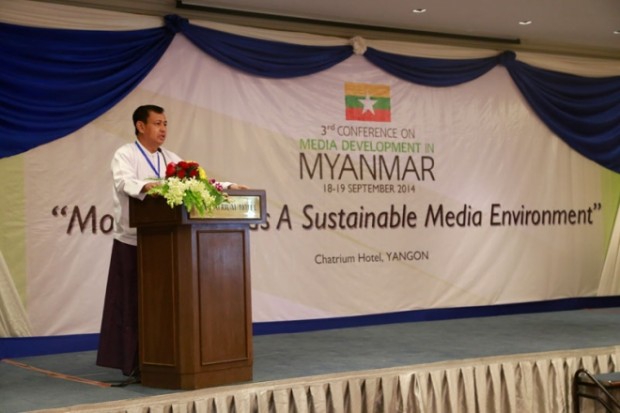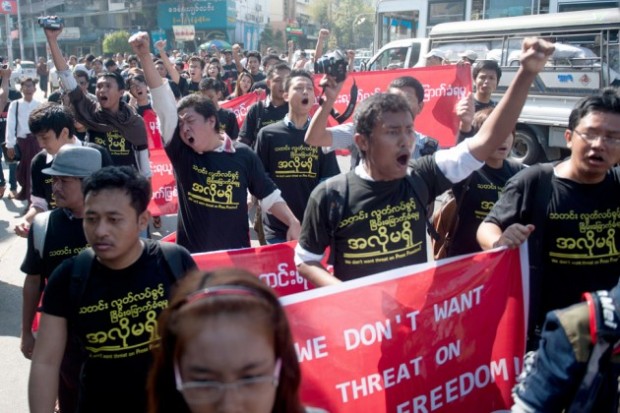
Information Minister U Ye Htut speaks during the opening session of the third annual conference on media development in Myanmar on September 18. The two-day event is being held at the Chatrium Hotel, Yangon. Photo: Bo Bo/Mizzima
Over the past two years, the euphoria surrounding the rebirth of independent media in Myanmar has given way to increasing concern in light of high profile setbacks, including the arrest and harsh sentencing of prominent journalists and the passage of controversial new media laws. It is unclear if this is merely a temporary setback or long-term trend, but it was in this context that the 3rd Conference on Media Development in Myanmar took place on September 18th and 19th in Yangon.
The conference brought together media actors in Myanmar and around the world, as well as civil society leaders and public officials. The two day event focused on “moving towards a sustainable media environment” and included sessions on reforming the broadcast sector, community radio, the press council, sustainable business models and media law reform (See entire conference agenda here). Among the takeaways from the conference was the need for greater professionalism among journalists, and the critical role they will play in the run-up to the 2015 elections. And while developing more capable journalists is crucial for creating a strong and viable media sector in Myanmar, a fundamental weakness for the sector continues to be the legal environment.
Although some of Myanmar’s most draconian media laws and institutions were discarded by current President Thein Sein, significant new legislation has underwhelmed observers. Two of the most notable pieces of legislation that passed parliament, the Printers and Publishers Enterprise Law and the 2014 News Media Law of Myanmar, were both met with concern.
Of the News Media Law, the NGO Article 19 warns that the law’s language is “so heavily qualified or contradicted…” that “…they will have little practical impact on media freedoms in the country.” The Printers and Publishers Enterprise Law, meanwhile, has been criticized for vague language that could easily be used to reintroduce government censorship.

Reporters hold banners and shout slogans as they attend a demonstration march for press freedom in Yangon.
How could a more open political system in Myanmar, with a pro-reform government and a substantial bloc of pro-democracy parliamentarians, fail to deliver stronger reforms? Part of the answer lies in the parliament’s failure to provide adequate checks on the laws developed by the Ministry of Information. Although some amendments were made, these two bills survived largely intact. In fact, Professor Christina Fink of the George Washington University noted at an Internews event earlier this year that many members of the opposition voted for the Printers and Publishers Enterprise Law without even reading it.
In order to develop an enabling legal environment for media, sufficient political support must exist within political institutions, and especially in the Parliament. Without a constituency for media, deeply flawed legislation will pass and undermine the development of the media sector to grow independently and sustainably. Even a small contingent of parliamentarians devoted to media reform could make an impact.
While Myanmar’s minister of information, U Ye Htut, notes that media reform “is the most important process in President U Thein Sen’s reform” agenda, progressive reform requires tangible engagement and support from members of parliament. Through greater engagement with members of parliament and coalition-building among civil society groups, donors could have a greater impact on the development of a sustainable media environment. Enhancing the professionalism of journalists is important work, but without engagement of the public sector, the space for journalists to operate will continue to be limited by weak legal protections.

Comments (0)